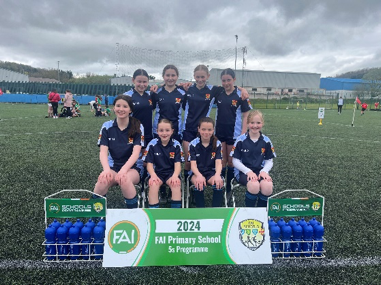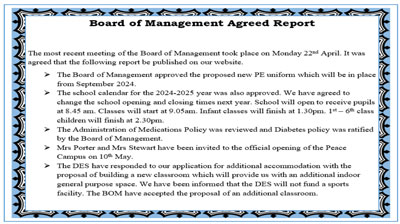This policy is devised to ensure equality of access for all pupils and staff in the school environment and to ensure that no conditions be allowed which may hinder an individual (or groups) participation in school life.
This policy is designed to comply with various acts of the Oireachtas such as Education Act (1998) the Equal Status Act (2000) and the Employment Equality Act (1998). It seeks to promote the principles of justice and equality for all members of the school community. All staff of the school are made aware of their responsibilities in respect to this.
Rationale
The purpose of this policy is:
- To enable all pupils to access and participate in education
- To promote the principles of justice and equality for all
- To encourage critical reflection on school norms and practices
- To comply with Equality legislation - Education Act 1998, Employment Equality Act 1998, Equal Status Act 2000 & Equality Act 2004
- To review existing policy within our school
- To promote a harmonious and pleasant working environment for staff and pupils
Relationship to characteristic spirit of the school
- The Model School is committed to the preparation of pupils for life in a multi-cultural society and to promoting the values of respect for all, in a caring and safe environment.
- Our School is also committed to enabling each person to participate in all school related and extra -curricular activities
Aims
By implementing this policy the school hopes:
- To ensure the promotion of equal opportunities for all persons in the school activities regardless of physical disability, gender, race, religion or learning disability.
- To create and maintain an environment where diversity is valued and celebrated
- That each person in the school feels valued and respected
- To ensure that the school complies with legislative requirements and principles of good practice.
- To promote a harmonious and pleasant working environment for staff and pupils where everyone feels valued and respected.
Vision Statement
Through creating an environment which reflects diversity in a positive manner the Model School seeks to nurture a sense of personal identity, self-esteem and awareness of one’s particular abilities, aptitudes and limitations, combined with a respect for the rights and beliefs of others.
Organisational Areas
Enrolment
The enrolment criteria of The Model School will not differentiate between pupils from different social strata. There is an equal right of access under the school’s Enrolment Policy.
- A new application form for admission to school has been formulated which will ensure equality of access and enable additional supports to be put in place at the earliest possible opportunity when the need arises.
- Pupils will be placed in age appropriate classes. However when a child does not have command of the English language or does not have a history of schooling it is often more appropriate to place him/her in a class below to facilitate language acquisition and development.
- The enrolment form takes into account the diversity of family structures that exist in present day society.
Staff
- All appointment procedures followed by the Board of Management comply with the Constitution of Boards and Rules of Procedure for National Schools, DES, 2007.
- Nothing may appear in an advertisement which would indicate a preference for one gender over another.
- Neither may any question be asked at interview which could be interpreted as discrimination on gender grounds.
- This school is an Equal Opportunities Employer.
Parental Involvement
- Every effort is made to support parents whose first language is not English. Some school policies and letters have been translated into another language to facilitate foreign students.
- All parents are encouraged to get involved in the Parents Association and to attend functions and activities organised by them and by the school.
- Where necessary an interpreter will be employed to use sign language for parents who may not be able to hear or speak.
Uniform
It is agreed with the B.O.M. and parents that all pupils in Model School shall wear a uniform. In the case of parents who cannot afford to buy a uniform for their child the school offers good quality second hand uniforms.
The wearing of dangling or hoop earrings is banned.
Code of Behaviour and Anti Bullying Policy
- The Model School Code of Behaviour and Anti-Bullying Policy promotes respect for all.
- The Code of Behaviour addresses procedures for dealing with all forms of unacceptable behaviour including racist comments or other incidents which may discriminate on the grounds of religion or race.
Homework
- Our Homework Policy addresses issues in relation to
- pupils with special needs
- pupils whose first language is not English and may need different work from the majority of pupils in a class.
- the involvement of parents
Resources
- It is school policy to provide a gender-balanced range of resources in curricular areas - textbooks, ancillary materials, software, sports equipment, toys in Infant room etc.
- Language support is available to pupils who need extra help in grasping language skills and vocabulary as human resources permit.
- Arrangements are made for support teaching in English, Maths and English as an Additional Language; such arrangements may differ from year to year, dependant on the allocation of staffing from the DES.
- Positive images of other cultures are displayed in the school environment and classrooms. We aim to have an annual multi-cultural day in school. This is organised by the school liaison person.
- Principles of equality and respect for diversity are reflected in the pupils’ textbooks and our class libraries contain a good variety of books which reflect the diversity of modern day society.
- Boys and Girls have equal access to all school resources and are equally represented on any duty lists in school.
- Varied resources are available to support pupils with a learning disability (Special Needs Policy)
Playground
All yard rules and allocation of space promote equal access for pupils. Infants and First Class pupils play in the middle yard at all times and other classes alternate between yards to allow equal access to all facilities. All yard rules reflect our policy of inclusion within a safe environment. There is disabled access to the playground via a ramp in the lower yard.
Tours and Extra-Curricular Activities
- All pupils have opportunities to participate in school tours or other outings organised by the school. (Some families who are awaiting permanent residency may be restricted in their movement by the State. In such instances the parents/guardians make the decision.)
Transition to Post Primary
- All pupils have equal access to transfer/transition programmes and the services and advice of a Home School Liaison Teacher. Pupils are free to attend an induction day in the school to which they are applying to transfer.
Allocation of Classes
Where multi-classes have to be created consideration will be given to a number of factors.
The following are the criteria that may be considered in isolation or collectively when splitting Junior Classes:
- Oral language, Literacy and Numeracy achievements at the end of the previous school year.
- Social and self-regulation skills
- Number of children in the classroom
- Gender equalities
- Potential friendship groups
The following are the criteria that may be considered in isolation or collectively when splitting Middle or Senior Classes:
- Literacy scores at the end of the previous school year
- Overall academic ability and ability to cope in higher level classroom
- Gender ie all girls with 4th, all boys with 6th
- Number of children in the classroom
- Balancing academic ability with friendship groupings.
- Other considerations specific to that particular group of children and their learning and social histories in school.
This will be done by the principal in consultation with the class teacher and will ensure a gender balance in all classrooms where possible.
Curriculum
- Every opportunity will be taken to promote gender equality through the discreet and hidden curriculum.
The hidden Curriculum includes:
- Teachers’ expectations of pupils
- Teachers’ interaction with each other and with pupils
- Allocation of tasks, equipment and resources equally among boys and girls
- Organisation of timetable and choices within
- The extent to which others are involved in decision-making
- Rules, casual remarks and all the day- to- day experiences in school
- Parents from non-Christian religions have the right to withdraw pupils from participation in RE classes. Children will stay in the room and do something else at this time. It is not possible to provide physical or human resources for supervision outside the classroom.
- Parental consent is sought for some lessons and programmes in the SPHE curriculum.
- Teachers shall ensure that the language used in the school to mediate the curriculum is gender balanced and shall avail of opportunities to raise pupils’ awareness of unconsciously held attitudes.
- Subjects such as Drama, SPHE, Music, Visual Arts and SESE are regularly used to celebrate difference and diversity within the class and to promote tolerance and cultural awareness.
Opportunities may be provided to explore the teachings and values of other religions and cultures in 5th & 6th Classes
- Equal opportunity is afforded to all pupils for participation in PE activities with adaptation of lessons for Special Needs pupils where necessary (PE Policy). Health and Safety will always be a consideration.
Success Criteria
The success of this policy will be determined by:
- Pupils participating in all areas of school life at a level appropriate to their abilities
- Awareness of the concepts of equality and justice
- Reduction in incidents of bullying/racism
- Pupils using appropriate language
- Parental satisfaction with the values being promoted in the school
- Mutual respect between parents, pupils, teachers and all ancillary staff.
- Good working relationships within the school
Roles and Responsibility
All members of staff, pupils, parents and BOM are responsible for implementing this policy and ensuring equal access and participation by the entire school community.
All staff members have responsibility for promoting the concept of equality and justice for all, both within specific educational programmes and in the “hidden” curriculum throughout the school day.
Timetable for Review
Policy will be reviewed every three years and any amendments noted.
Reference Section
- Equal Measures, Dept of Education and Science, 2006
- Together towards inclusion – Toolkit for Diversity in the Primary School, IILT & SELB, 2007
- Up and Away – A resource book for English language support in primary schools, IILT, 2006
- Intercultural Education in the Primary School – Guidelines for Schools, NCCA, 2005
- Intercultural Guidelines for Schools, INTO
- The Inclusive School, Equality Authority, 2004
- Equality and Education, The Equality Authority, 2001
- Guidelines on Traveller Education for Primary Schools, 2002
- Working Together. Procedures and Policies for Positive Staff Relations, INTO, 2000
- Department of Education Guidelines on Countering Bullying Behaviour in Primary and Post Primary School, September, 1993
- Education Act, 1998
- Equal Status Act, 2000
- Equal Status Act 2000. Questions & Answers, INTO, 2003
- Equality Act, 2004
- Education for Persons with Special Educational Needs Act, 2004






